Poseidon
 for intense prolonged sequences of disaster and peril.
for intense prolonged sequences of disaster and peril.
Reviewed by: Kenneth R. Morefield, Ph.D.
CONTRIBUTOR
| Moral Rating: | Average |
| Moviemaking Quality: |
|
| Primary Audience: | Adults Teens |
| Genre: | Action Thriller Remake |
| Length: | 1 hr. 39 mins. |
| Year of Release: | 2006 |
| USA Release: |
May 12, 2006 (wide) |
| Featuring |
|---|
| Kurt Russell, Emmy Rossum, Richard Dreyfuss, Mike Vogel, Josh Lucas, Freddy Rodriguez, Jacinda Barrett, Jimmy Bennett, Kevin Dillon, Ma Maestro, Andre Braugher, Stacy Ferguson |
| Director |
|
Wolfgang Petersen |
| Producer |
| Wolfgang Petersen, Mike Fleiss, Akiva Goldsman, Duncan Henderson |
| Distributor |
Plot: When an ocean liner is capsized, passengers must try to get out before it sinks.

Before there was Father Karras, the skeptical priest of William Friedkin’s 1973 film “The Exorcist”, there was Frank Scott (Gene Hackman), the skeptical/radical priest in Ronald Neame’s 1972 horror flick, “The Poseidon Adventure”. Both these films were based on novels; Friedkin’s was taken from William Peter Blatty’s work, Neame’s from a less famous work by Paul Gallico. Coming after the socially and politically turbulent 1960s and dealing with cynical audiences increasingly disillusioned by Watergate and the Vietnam war, these works used radical or skeptical priests to symbolize white, anglo-saxon, protestants’ increasingly ambivalent relationship with Christianity.
Hackman’s Frank Scott is, for all intents and purposes, a deist. He delivers a pre-disaster sermon in which he assures his listeners that God helps those who help themselves; when his superior in the church elects to stay with and attempt to comfort those awaiting rescue rather than attempt to escape, Scott chastises that such a death is “meaningless.” Scott’s character is not in “Poseidon”. The tug-of-war between religious and civil authority between Scott and Ernest Borgnine’s Lt. Mike Rogo is replaced with one between Josh Lucas (as a never quite convincing loner) and Kurt Russell (as an equally unconvincing mayor who will do anything to save his family).
There is, I think, a Darwinian subtext running through both films. For those who think I read too much symbolism into the film here, I recommend re-watching the Captain’s (Andre Braugher) New Year’s Eve speech describing man emerging from the primordial sea since it provides the key to the film’s metaphorical coda. As the state ship overturns, survival is meted out in accordance to those who have skills rather than privilege and—above all—a will to live. The ascent to life is actually a descent to the bowels of the ship, symbolizing a shedding of the inessential trappings of wealth and luxury.
In this theme, the film panders to the audience, reassuring it that Americans have not been made soft and docile by wealth and privilege but retain the ingenuity and skills that allowed them to acquire it in the first place.
Yet there is also a moral superiority to our representatives, one that differentiates them from other, evil representatives of social darwinism by their predictable willingness to sacrifice the strongest members to preserve the weakest ones. The 1972 film bends over backwards to have Scott practically beg those awaiting rescue to attempt escape thus making their deaths an almost appropriate response to their surrender. His pleadings resemble those of Sam Hall in the recent disaster flick “The Day After Tomorrow”, each film deftly alleviating its heroes of the problem of caring for those who cannot care for themselves (they are heroes, after all, not saints) while absolving them of the guilt of actively turning away from the helpless to preserve themselves.
Both films, that is to say, cheat when confronting the key formula of a disaster picture. The whole point of the disaster picture is to allow the audience to see man’s hidden or submerged character revealed by circumstances, to show if—to paraphrase the famous line from “Starman”—we are at our best when things are worse.
It is interesting, then, that the 2006 film includes a scene in which Richard Dreyfuss’s character must kick Freddy Rodiguez’s character off him so that he (Dreyffus) can be lifted to safety. Given the recent debates surrounding the status of illegal immigrants in this country, it was hard not to read this scene as a metaphor for America’s increasingly anti-immigrant sentiments. Before our gang reaches safety, the other Hispanic, herself a stowaway, will also be dead, allowing only the white-anglo-saxon protestants and gay Jew to survive. Braugher’s captain—the only African-American in the film—will also go down with the ship. Give us your poor huddled masses yearning to breathe free but not so many as will drag us under, I guess.
The 2006 film also fails to satisfy for a different reason. It is an action movie only masquerading as a disaster film. My central thesis surrounding action films is that unless one cares about the characters in an action film it is hard to care about what happens to them. In “Poseidon” we get establishing characteristics rather than character development, so when the rogue wave topples the ship a scant fifteen to twenty minutes in, we are left with one long chase sequence. As well as being flat, the characters are relatively static; they do not change much during the film nor respond to what happens to them. The simply run from one room to the next.
Let’s be honest, though. The biggest problem facing “Poseidon”, the one it does not even begin to solve, is the long shadow cast over it by “United 93” and the events that spawned that film. Action movies are pure escapism; the audience is continually reassured that nothing they see—especially death and suffering—is real. Drama is supposed to probe the audience, prompting it to look at and deal with ideas and problems rather than merely escape from them into a fantasy world where they don’t exist. The disaster film is essentially a hybrid, half action flick, half drama, maintaining its effectiveness only to the extent that it retains marginal plausibility and thus allowing the audience to envisage the normal person (rather than the uberman who masquerades as the normal person in the action flick) dealing with extraordinary circumstances. As an action film in disaster clothing, “Poseidon” fails to provide either a momentary escape from the omnipresence of human suffering nor an honest examination of it.
Kurt Russell gets to ascend with Bruce Willis’s “Armageddon” character to a heaven where daughters are dutiful and son-in-laws deferential. Jacinda Barrett gets to live in a world where single moms find surrogate dads who look like Josh Lucas rather than Dwayne Schneider. We, the audience, get to see lots of CGI special effects and two hours of women and children in peril without any real fear that we might be told the disturbing truth that we can’t always save them.
It’s not a bad movie, really. Just an abrasively phony one.
My Grade: C
Violence: Moderate / Profanity: Moderate / Sex/Nudity: Minor


Better than Average / 3
Better than Average / 3
Average / 5
Average / 3
Good / 1
On the positive, it was fairly tense and gripping. There were some scenes that made me tense in anticipation in sticky situations. The effects were also pretty good, such as the massive “rogue wave” and the resulting capsizing of the ship Poseidon, and stood up well in the entire movie. It also demonstrated the effects of teamwork and how people can work together in a disaster-type situation to reach a common goal—to get out of the ship together. The planning and demonstration of leadership was well presented in this film.
However, on the flip side, there were some things that could have been improved. The acting was fairly down in this movie, as well as some woeful dialogue. There was one person that joined the team (briefly) that showed some character before his arrogance led to his death. I think that there should have been some characters that needed more “livening up” and therefore giving a bit of diversity and uniqueness within the small team. As well as that, in some cases, there was a fair bit of predictability, the ending being one of those cases. I felt that the ending was fairly flat and that some scenes were too similar to that of “Armageddon” and “The Day After Tomorrow.”
This isn’t a bad or offensive movie. It’s just a really average one. It’s the sort of movie that is more “escapist” entertainment, where your brain can go on neutral. However, if you want to have a movie with a lot of diversity and originality, I’d suggest that you wait for the upcoming movies “Superman Returns,” “Pirates of the Caribbean: Dead Man’s Chest” or even “Cars.”
Average / 3
Average / 2
Very Offensive / 4
Better than Average / 3
Average / 4
Average / 5
Also, as you are taken from different parts of the ship and introduced to the different characters who you will be watching the rest of the film, I noticed that they just had to put in a lesbian. Why is it that you have to have a homosexual in every movie now? It certainly doesn’t improve the plot in my mind.
I haven’t seen the prequels, so I am no judge on what they did right on wrong based on that score. But it seemed to me that even though they had excellent actors (You felt their panic vividly) and the special affects were amazing (It’s incredible how they filled in every detail) you still get the feeling that they are relying too much on suspense. There were several scenes that could have been cut; they added nothing to the film except panic and a sense of dread. When the survivors finally make it out, you are expecting something else to happen to them because there is no way they can just be happy now. After this movie, you feel like you should go watch something with teddy bears and sunshine in it so you won’t feel so dark, and morbid. This is definitely not a movie for children! The carnage and excitement would be too much.
The story itself is touching. A band of people who normally wouldn’t have conversed or even seen each other are now relying on one-another and calling everybody by their first names. The ingenuity and savvy of the small band are interesting to watch. The father-daughter relationship is bittersweet as it changes and then is drawn to a conclusion. Everyone is changed at the end of the movie, but I notice that the one who was contemplating suicide is as anxious as the rest to make it out alive after the accident. I personally do not want to see it again for a few years at least. As a Christian, I think the cussing was too heavy, the dresses too low… and the ending sad. …
Average / 3
Average / 5
Better than Average / 5
Average / 2
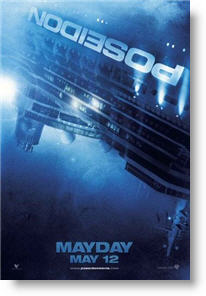

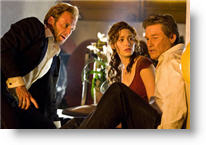
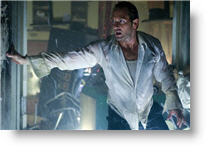
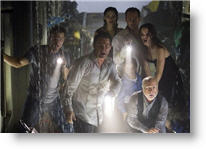

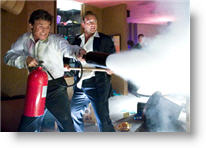
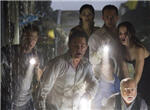

Gone is the fat lady whose struggle to survive ultimately leads her to save Scott at the expense of her own life. Gone is Mr. Rogo constantly second-guessing Scott all the while setting himself up as the obvious person to fill Scott’s shoes once he was gone. These characters were rich and fascinating, but the new movie replaces them with superficial and average people who move through the ship so quickly that you’d think they weren’t the least bit worried about the possibility that they might die. Kurt Russell and Richard Dreyfuss are well-known actors of course, but casting Dreyfuss as a gay man going through heartbreak following the end of his relationship with another man reminded me that Hollywood will use any movie as a vehicle to further its pro-homosexual agenda. This movie would clearly have not done any worse without this type of character, and whereas gay characters were central to Brokeback Mountain, they were completely unnecessary here. The special effects are obviously much improved over the original. The ship itself is more impressive, and the enormous rogue wave the ultimately capsizes the ship is breathtaking. …
My Ratings: Offensive / 3